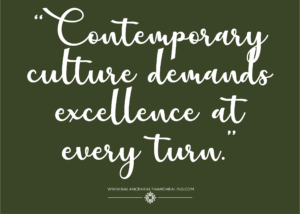The fifth and final year of my doctoral program consists of an intensive clinical internship. That means I spent the beginning of this year, my fourth, preoccupied with the application process. Fifteen sites, fifteen cover letters, four essays, three letters of recommendation—the list goes on. Only when the process ended at the beginning of November did I realize how stressed I’d been.
So, when the opportunity to visit San Diego with some family, my girlfriend, and several close friends arose, I quickly capitalized. Two classmates accompanied me, and we all noticed a similar experience in the buildup to the decision. It took work to let go. An argument ensued between us and our inner meritocrats:
“Four days at the beach with friends and family? That sounds lovely. Plus, it’ll be a nice way to celebrate submitting applications.”
“Yeah, but what about your dissertation? You think it’s gonna write itself?”
“Well, no, but—”
“Not to mention you might fall behind on your teaching and classwork.”
“Okay, fair. You seem to know me. But I don’t get to spend much time with these people, much less in such a relaxing environment.”
“You’ll get to spend time however you want once you achieve enough.”
At this point, we all snapped and rebelled: “You know what? I’m going. And I’m not even taking my laptop.”
The Battles
Unfortunately, similar battles with the inner meritocrat happen all the time, often without our awareness. This ethos runs deep in our society. A close family member of mine recently said, “When the day comes that I can no longer participate in the economy, I don’t see why I should go on living and taking up space and resources.” Contemporary culture demands excellence at every turn. It conflates human value with economic generativity. I believe as we grow up and buy into the system, these ideas distort how we relate to ourselves and to others.
 Notice people’s language. Many say that they must “earn” delicious food through a disciplined diet or through exercise, or that they don’t deserve to see a movie because they’ve made paltry progress on an essay. Couples often engage in “scorekeeping,” a behavior where they track the rights and wrongs of their partners and feel slighted if the balance falls off-kilter. Perhaps the majority of our social interactions are contractual. Despite the pleasantries and niceties, we encounter most people in transactions (as waiters, cashiers, professors, or doctors). We even use these titles to respond to the question, “What are you?” Considering this, it’s hardly surprising that we monitor and criticize ourselves to sometimes dehumanizing degrees. Joy and delight, within this system, are second-class aims. We are worth merely whatever resources we are capable of eliciting from others.
Notice people’s language. Many say that they must “earn” delicious food through a disciplined diet or through exercise, or that they don’t deserve to see a movie because they’ve made paltry progress on an essay. Couples often engage in “scorekeeping,” a behavior where they track the rights and wrongs of their partners and feel slighted if the balance falls off-kilter. Perhaps the majority of our social interactions are contractual. Despite the pleasantries and niceties, we encounter most people in transactions (as waiters, cashiers, professors, or doctors). We even use these titles to respond to the question, “What are you?” Considering this, it’s hardly surprising that we monitor and criticize ourselves to sometimes dehumanizing degrees. Joy and delight, within this system, are second-class aims. We are worth merely whatever resources we are capable of eliciting from others.
Self-Care
Sometimes people, myself and other clinicians included, tout self-care as a means of managing fatigue and increasing productivity in the long run. While it does these things well, framing self-care this way misses a more important point—that our capacity for joy and connection trumps our economic or social output. You deserve to eat delicious food simply because you’re alive. You deserve to enjoy a story or a night with friends because those things are what make life vital. I believe work and performance, necessary and absorbing as they are, ought to serve the higher ends that we often relegate to the luxury of self-care. In fact, I’m not crazy about the term “self-care” (heresy for a therapist!) because it suggests a kind of instrumental maintenance of the self rather than a deep realignment with what matters. “Focus on self-care so you can get back in the game refreshed and ready to tackle the workplace,” the logic often goes. Instead, what if we reframed self-care as wholehearted engagement with life?
Annie Dillard famously wrote that “how we spend our days is . . . how we spend our lives.” I have found these words both haunting and encouraging since I read them in college. When I pause and think about how I spend my days, it strikes me how much time I’ve sat alone behind a screen, ostensibly being productive, but isolated from the people and activities that I want my life to revolve around. I’m not advocating for a counter-cultural or monastic lifestyle. Most of us clearly gain a lot from participating in a society with stringent work standards, where ability counts for more than birthright. Still, the race to succeed can obfuscate what kinds of lives we want to make. And, as Uncle Iroh said in Avatar: The Last Airbender, “Life happens wherever you are, whether you make it or not.”
During our last night in San Diego, my friends and I visited the beach well after the sun had set, the fog had settled, and the crowds had drifted home. We had miles of sand to ourselves, just us and the rhythmic crashing of waves on the shore. We played games. We invented competitions and spent countless minutes laughing at ourselves. Looking up at my friends, their smiles lit on one side by the moon and on the other by the glow of the city, I remembered what C.S. Lewis said about these sorts of evenings, when “the whole group is together; each bringing out what is best, wisest, or funniest in all the others.” He called them “golden sessions” and stressed that life had “no better gift to give.” In those moments it was clear that the trip I’d justified on the basis of self-care was justified for reasons far more important. Those vibrant, connected times were the gold, that for the sake of which all my work mattered in the first place. But, my oh my, how easy it is to forget.
ourselves, just us and the rhythmic crashing of waves on the shore. We played games. We invented competitions and spent countless minutes laughing at ourselves. Looking up at my friends, their smiles lit on one side by the moon and on the other by the glow of the city, I remembered what C.S. Lewis said about these sorts of evenings, when “the whole group is together; each bringing out what is best, wisest, or funniest in all the others.” He called them “golden sessions” and stressed that life had “no better gift to give.” In those moments it was clear that the trip I’d justified on the basis of self-care was justified for reasons far more important. Those vibrant, connected times were the gold, that for the sake of which all my work mattered in the first place. But, my oh my, how easy it is to forget.

